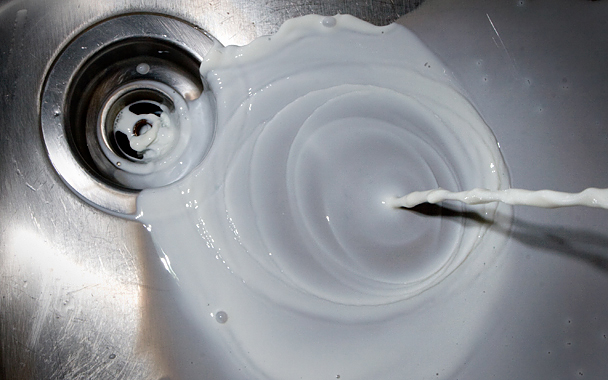There is no more jaw-dropping signal that the agriculture economy is under stress than the fact that dairy farmers are pouring milk down the drain. It happens rarely, but the images last for decades, and the root cause is always the same. Overproduction leads to surplus, which leads to low prices. Low prices force farmers to push the land harder and increase production, just to generate the same bottom line.
It’s one thing for production to get out of whack with prices in the volatile commodity sector of industrial agriculture, but that could never happen to organic farmers … Could it?
Organic agriculture has always had a strong component of holistic philosophy to temper bottom-line economics. The market has grown rapidly in recent years, but it is still small. Relationships between farmers and processors are often personal and longstanding. Marketing companies often have their roots in organic farm co-operatives. The language of “us versus them” just doesn’t fit the principles and community spirit of many organic pioneers.
So it comes as a shock during these hard economic times that some processors have recently notified their dairy partners that demand for organic milk is slipping. They have responded to what may be a five percent surplus in the market by reducing the price they pay to farmers and informing farmers who are in the middle of the tedious three-year process of organic certification that there will be no new contracts in the future. Pushing price changes down the food chain to organic grain farmers who produce the feed that organic dairy cattle eat is inevitable.
This approach has a growing number of organic farmers shaking their heads in disbelief. “What’s discouraging is we’re following the pattern of the traditional commodity market—gouge the farmer,” says Charlie Johnson, a South Dakota grain farmer and organic pioneer. He argues that after a decade of steady growth, organic farmers should face the recession with innovative strategies that extend beyond production. “Organic needs to differentiate itself not just on the production end, but also on the marketing end,” he says. “We’ve never had to deal with that. This is the first time organic farmers are being told they are growing too much.”
Recalling the idealism of the early organic movement, Johnson has begun to circulate an open letter that seeks to combine community values with practical economics. In it, he states, “As organic producers, we understand we are more than just the food we produce. We are part of a community—one that cares about the soil, the environment, and most importantly, its people. So would it not better serve our mission to allow our overproduction to be used to serve our communities, rather than allow a 5% surplus to ruin 100% of our market? We need to be proactive; we need to implement a ’Surplus is a Blessing’ program, because as long as there are children going to bed hungry and arriving to school hungry, there is no such thing as a SURPLUS.”
Johnson goes on to say, “For one month, perhaps on a rotating basis, organic producers from all sectors would forgo 5% of their volume or gross sales to be used for charitable food outreach. Such an outreach would involve only 1 1/2 days’ worth of volume or sales, less than 1/2% annually. Dairy producers could ask that their 5% volume go to local school or food pantries. Processors and cooperatives could provide the service and distribution to make the outreach possible.”
As Charlie Johnson and other organic farmers prepare for the spring planting, they cannot help but wonder how these growth pains of the organic market will play out if the recession economy continues to weaken.
Coming next: How are organic processors responding to the recession?




 Pinterest
Pinterest


